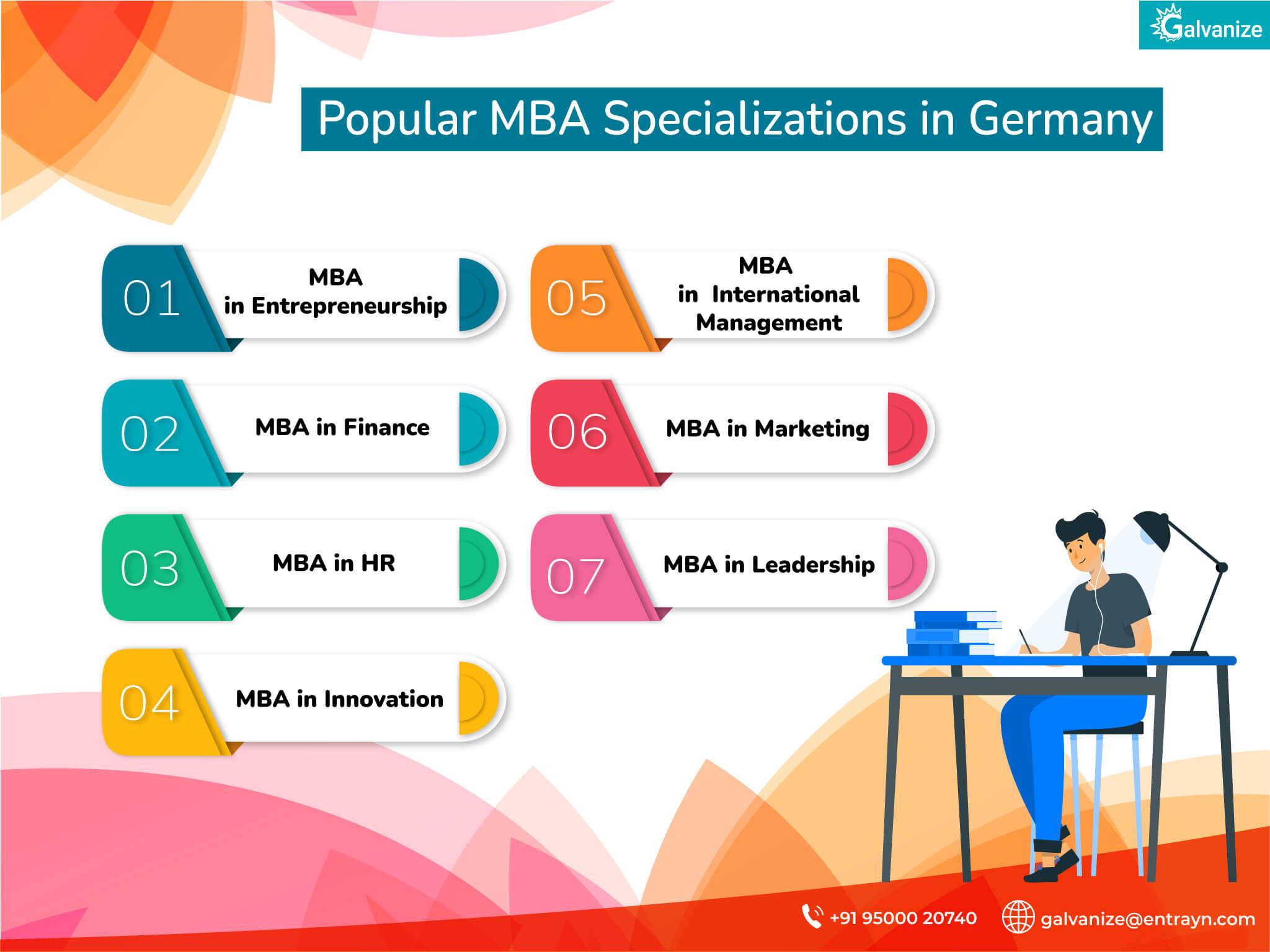
Chapter 1
Overview
If you want to start a career in management, getting an MBA in Germany could be your step to success. German MBA degrees have become much more prestigious and competitive, with foreign students accounting for a large portion of the demand.
According to Studying-in-Germany.org, about 400,000 overseas students are now enrolled in Germany, with the vast majority intending to stay and work in the country following graduation.
Although less well-known than standard MBA programs, several German institutions are located in flourishing economic locations with promising future prospects. Read on to learn all the necessary information regarding MBA in Germany.
Why Study MBA in Germany?
Here is why you should pursue an MBA in Germany:
Affordable Tuition Fees:
Tuition expenses are frequently the most significant financial worry for international students, and MBA programs are expensive. Although public higher education in Germany is free, the best German MBA institutions are privately owned and charge tuition.
However, the cost is far lower compared to top MBA programs in the UK and the US. The full-time MBA program at the University of Oxford, for example, costs roughly $85,000, while the MBA at the Frankfurt School of Finance and Management costs $47,000.
World-class Education:
According to the Financial Times and QS Top Universities MBA rankings, numerous German MBA schools are among the world’s top 100 or 200 MBA universities.
Their strong academic basis, built on a long and extensive experience, ensures you will profit greatly and pave the way for a tough but rewarding future.
They can quickly identify your intellectual capabilities and, in collaboration with the University’s career counselling team, can assist you in finding the appropriate vocation.
MBAs in English:
According to a study, German schools’ most popular study programs are business-related and sociology courses.
German institutions have steadily upped the number of postgraduate courses provided in English in recent times.
Innovative Curricula:
MBA programs in Germany are constantly revising their study modules and curricula to be leaders in research and teaching development.
Your MBA program in Germany will teach you fundamental business concepts and topics and help you develop an autonomous business style and generate unique ideas. The courses involve practical sessions under a professional provision that will help you enhance your decision-making skills.
The full-time MBA at Frankfurt School, for example, includes an Individual Research Project, which is a research of a real-life business challenge conducted in partnership with a commercial firm.
German Language :
German is one of the most spoken languages out there. Moreover, at a period of globalization, many German businesses are moving and expanding their international partners while also welcoming foreign workers into Germany.
Pursuing an MBA in Germany allows you to learn a language that will provide you with a large pool of work and career chances.
MBA Scholarships :
In addition to being an economical destination to study and live in, Germany offers a variety of possibilities for financing your studies. Every year, the German government awards thousands of scholarships given to outstanding overseas students.
Personal scholarship programs are available at German MBA schools for overseas students. In addition, many organizations evaluate promising applicants and approach them with appealing offers, giving them high-paying jobs in exchange for paying for their studies in Germany.
Future Employability
German MBA programs are highly research-based universities that prepare you for the job market by providing the necessary skills and information. German cities such as Frankfurt are prized as European financial and business capitals. They are home to globally recognized firms such as Bosch, Google, Adidas, Amazon, the European Central Bank, and car manufacturers Daimler, Porsche, and Volkswagen. Furthermore, all of these businesses hire MBA graduates from state schools.
Germany is also one of the simplest countries to obtain a work visa, with various profitable visa alternatives available to anyone with strong abilities and a good educational record.
A Lifetime Experience:
Apart from your academic adventure, pursuing an MBA in Germany is not just about obtaining a degree; there are endless things to experience in beautiful Germany.
The foreign student community in Germany is extremely diverse, allowing students to connect with people from all over the world while learning about their culture, traditions, and customs. Germany is also home to amazing scenery such as the Black Forest and historic castles like Neuschwanstein in Bavaria, which influenced Disney’s, Cinderella Castle!
MBA vs MIM
While the MBA was founded over 100 years ago at Harvard in the United States, the MiM has only gained popularity in the last 20 years.
While both programs cover various business topics and broad business principles, the MBA is typically tailored for persons with a few years of professional experience.
The MBA is seen as a job accelerator or a tool for professional development or transition. On the other hand, the MIM is more of a career jumpstart for those with little or no work experience and who recently completed their undergraduate degrees.
Compared to the MBA, the MiM draws younger students, with most MiM candidates in their early 20s.
The MiM admissions procedure places less emphasis on the job experience, although the application process is quite comparable to an MBA. Most programmes demand references, essays, and standardized exam results (like the GMAT and GRE).
The MiM is intended to assist pre-experienced applicants in launching their careers. There is an emphasis on developing a good managerial foundation and, in many cases, on the global aspect of the business.
MiM graduates typically seek entry-level roles, but MBA graduates typically seek mid-to senior-level positions. In addition, those with MBAs will demand higher compensation, thanks in part to their prior work experience.
Chapter 2
Eligibility Criteria for Study MBA in Germany
Universities in Germany are frequently supported by the state but are not primarily regulated. In other words, the eligibility requirements and cut off are determined independently by several German institutions. Hence, it is feasible for every institution to have some distinct eligibility criteria. Therefore, it is always advised for hopefuls to verify with the university officials for the precise eligibility criteria of the programme.
In general, to be eligible for an MBA programme in Germany, you must have finished the German form of a bachelor’s degree in the necessary areas. To apply for an MBA programme at a German university, candidates must have a 4-year Bachelor’s Degree or a 3-year degree with a 1-year Master’s Degree in Business Administration.
Some universities will accept a three-year degree combined with suitable work experience. However, it is always preferable for students to contact the University’s foreign admissions office directly to obtain the most up-to-date information.
Aside from the minimum requirements, colleges may also need students to have passed and scored a particular level in GMAT/IELTS/GRE/TOEFL exams and have a basic understanding of the German language. In addition, students must have a high level of expertise in German for classes offered in that language. Furthermore, to be eligible, candidates must take language proficiency exams such as TestDAF/DSH. Finally, students may also be required to take an Entrance Test to join the University.
Furthermore, always verify the institution for the tests needed to apply to your desired programme.
These are a few prerequisites for students applying for an MBA in Germany. Unfortunately, there are no hard and fast guidelines for determining if an applicant is eligible for an MBA in Germany. In addition, different universities and programmes require different categories to be met.
Another adaptable and popular programme for established workers in Germany is the Executive MBA. This MBA is primarily employer-sponsored and requires at least two years of previous work experience.
MS in Germany is also an excellent choice of higher education degree because you can study a wide range of courses with a Master’s of Science.
You can also pursue MBA in Germany for free; it is a government rule in Germany that education for students is provided at no expense; under these conditions, students can do MBA in Germany.
Chapter 3
MBA Colleges in Germany
The following are some of the best MBA universities in Germany, together with their QS global MBA rankings and degree fees:
|
University Name |
QS Ranking 2022 |
Average Fees in USD (annually) |
|
Technical University of Munich, Munich |
50 |
144 |
|
WHU-Otto Beisheim School of Management |
109 |
44,845 |
|
Technical University Berlin, Berlin |
159 |
17,643 |
|
University of Hamburg, Hamburg |
214 |
14,150 |
|
University of Bayreuth, Bayreuth |
521 |
11,329 |
|
University of Regensburg, Regensburg |
591 |
NA |
|
Leipzig University, Leipzig |
447 |
3,475 |
|
Saarland University, Saarbrucken |
447 |
13,590 |
|
Martin Luther University Halle-Wittenberg, Halle |
461 |
4,605 |
Technical University of Munich :
TUM offers 179 interdisciplinary programs in natural and life sciences, engineering sciences, management, social sciences, and medicine.
Admission to the Technical University of Munich is accessible in two semesters: winter and summer. TUM has nearly 42,700 students enrolled in graduate and undergraduate programs, with 13,858 international students. The admission offer is determined by several variables, including language competency, GATE/GRE score, professional experience, and work portfolio.
TUM provides financial assistance to its national and international students in the form of grants and scholarships depending on an excellent academic record, defined abilities, strong leadership traits, solid recommendations, or testimonials.
Highlights
| University Type | Public |
| Establishment Year | 1868 |
| Budget | EUR 1.553 billion |
| Number of Academic Departments | 15 |
| Number of Degree Programs | 179 |
| Mode of Programs | Full-time; Part-time; Online |
| Top Courses | Business, Management, Architecture, Biochemistry, Engineering |
| Work Experience | Required for some courses |
| International Student Percentage | 34% |
| Annual Estimated Cost of Attendance | EUR 10,460 |
| Contact International Office | +49 89 289 22245 |
WHU-Otto Beisheim School of Management
WHU has around 1669 students. The Foundation for International Business Administration Accreditation has granted accreditation to the school (FIBAA). Furthermore, the institute is accredited by the Association to Advance Collegiate Schools of Business (AACSB) and the European Quality Improvement System (EQUIS).
The business school is now operating at two campus sites in Vallendar, Rhine-Palatinate, i.e. the Vallendar Campus and the Dusseldorf Campus. As a consequence of the Instructor Evaluation System, students are given the option to review their mentors at the end of each course. The school also undertakes internal quality monitoring, such as “Assurance of Learning,” to preserve the institution’s educational standards.
| Institute Type | Private |
| Location | Vallendar, Rhine-Palatinate |
| Establishment Year | 1984 |
| Campus Setting | Rural |
| Accreditations | EQUIS, AACSB, FIBAA |
| No. of Campuses | 2 |
| Housing | Private apartments |
| Mode of Application | Online |
| Work-Study | Yes |
| Intake Type | Semester wise |
| Mode of Program | Full time/Part-time and online |
Technical University Berlin :
The University’s engineering courses in computer engineering, human sciences, management, mathematics, and mechanical engineering are well-known. In addition, TU Berlin offers 49 bachelor’s degrees and 95 master’s degrees through its seven faculties.
Even though only 23 master’s degrees are offered in English at TU Berlin, the institution enrolls roughly 27 percent of overseas students each year. Admissions to the Technical University of Berlin throughout the summer and winter semesters.
While there are no tuition costs at TU Berlin, university students must spend roughly 60,000 INR each year on semester fees, test fees, and other administrative expenses. In addition, students’ fees can include lodging and other living costs of up to 50,000 INR.
Highlights
| Location | Berlin |
| Type | Public University |
| Campus Setting | Urban |
| Establishment Year | 1879 |
| Average Fees | 308 EUR per semester |
| No. of Colleges | 7 |
| No. of Programs | Over 100 |
| No. of English Programs | 23 |
| Percentage of International Students | 26.7% (Summer 2020) |
| Contact Information | telefonservice@tu-berlin.de;
graduateadmissions@r1a.tu-berlin.de |
FAQs
When was Technical University Berlin established?
1879
Is Technical University Berlin a public university?
Yes, TUB is a public university
University of Hamburg :
The University of Hamburg has evolved into a famous international university in Germany. It got 42,856 entries for the 2019 academic year. Moreover, this University has been linked with some prominent researchers and Nobel Prize recipients, including Wolfgang Pauli, Otto Stern, and Agathe Lasch.
The University of Hamburg has approximately 170 academic programs spanning from art history and law to mathematics and physics. Bachelor’s programs are solely taught in German, although certain master’s programs are also accessible in English.
Highlights
| Type of University | Public |
| Campus Location | Hamburg, Germany |
| Campus Setting | Urban |
| Establishment Year | 1919 |
| Total Enrollment | 43,947 (2019-20) |
| % of International Students | 14% |
| No. of Programs Offered | Over 170 |
| Funding Received for 2019 | State: 541 million EUR;
External: 261 million EUR |
FAQs
How many programs are offered by the University of Hamburg?
More than 170 programs
University of Bayreuth
The University of Bayreuth, founded in 1975, is a public university in Bayreuth, Bavaria, Germany. It attracts many students and professors and bills itself as a family-friendly university. The University features a small and green campus where people from all over the world may interact, share ideas, and improve their creativity and ingenuity.
Highlights
| Type | Public |
| Campus setting | Urban |
| Application portal | Online portal |
| Academic calendar | Semester based |
| Intake Session | Winter/Summer |
| Mode of program | Full-time; part-time; Online |
| External funding | 58,066,700 EUR |
| Total No. of students | 13,329 |
| Financial aid | Scholarships; Grants; Loans |
FAQs
Is the University of Bayreuth a public university?
Yes
The University of Regensburg :
The University of Regensburg is a public university in Germany, located on the outskirts of Regensburg. The University, founded in 1962, offers a wide range of topics, highly skilled teachers, and first-rate facilities to its students. The institution began as a provincial university but has grown into a recognized teaching and research centre, drawing international students to study in Germany. The institution educates 21,167 students; 1,600 are international students from over 100 countries worldwide.
Highlights
| Established | 1962 |
| Type | Public |
| Campus setting | Urban |
| International Students | 7.7% |
| Application portal | Online for undergraduate admissions
Offline for graduate admissions |
| Academic calendar | Semester-based |
| Intake Session | Summer/winter |
| Number of courses | 244 |
| Mode of program | Full-time; part-time; online |
| Cost of Attendance | No tuition fees |
| Total No. of students | 21,167 |
| Financial aid | Grants, scholarships |
| Admission helpdesk | international.office@ur.de
studentenkanzlei@ur.de |
FAQs
How many courses are offered by the University of Regensburg?
244
Is the University of Regensburg a public university?
Yes
University of Leipzig :
The University of Leipzig is among Germany’s premier research and medical skills institutions. The University consists of 14 faculties, approximately 130 departments and institutes, and 17 central entities and provides 155 undergraduate and postgraduate degrees in law, communications, arts, sciences, foreign languages, and other fields. At various historical levels, Leipzig has reached several milestones.
Highlights
| Establishment year | 1409 |
| No of campuses | 1 |
| Total faculty | 14 |
| Academic staff | 2800 |
| Undergraduate enrolment (full time) | 538 |
| International students 1st-year percentage | 32% |
| Female Mail ratio | 59:31 |
| Degree programs | 155 |
| Employment in numbers | 5300 |
| Alumni | 2300 |
| Residences capacity | 5200 |
FAQs
When was the University of Leipzig established?
1409
Saarland University :
Saarland University in Germany is one of the country’s largest public research institutions. Saarland University has an international student body of over 3500 students from 120 countries worldwide. The institution provides over 100-degree programs at the undergraduate and graduate levels in eight distinct academic areas, overseen by six specific faculties.
The majority of courses at Saarland University begin in the winter semester. However, certain courses accept applications on a rolling basis. Because the German government pays tuition costs for international students, there are few universities in the world that are as inexpensive as Saarland University for international students.
Highlights
| Type of University | Public |
| Campus Setting | Urban |
| Student to Faculty Ratio | 6:1 |
| Total number of enrolments | 17,000+ |
| Percentage of International Students | 21% |
| Annual Acceptance Rate | 30%-40% |
| Test Scores Accepted | DSH, TestDaF, PNDS, etc. |
FAQs
What is the percentage of international students in Saarland University?
21%
Martin Luther University of Halle-Wittenberg :
The University offers 260 bachelor’s and master’s degree programmes across its 10 faculties. This University has over 2,100 international students, indicating its variety and safety. Renowned scientific institutes worldwide, including the Fraunhofer Society, the Max Planck Society, the Leibniz Association, and many more, have partnered with the University. In addition, the University has cooperated with 200 higher education institutions from across the world on academic courses and cooperative research initiatives.
Highlights
| Type | Public |
| Year of establishment | 1502 |
| Campus Setting | Urban |
| Application mode | Uni-assist
Official website |
| Courses offered | Bachelor, Master, Doctoral |
| Total students | 23,000 |
| Tuition fee | No tuition fee |
| International student population | 9% |
| Number of academic staffs | 2900 |
| Academic calendar | Semester (Winter and Summer) |
| International Admission helpdesk | info@international.uni-halle.de
phone: +49 345 55 21535 |
FAQs
Is Martin Luther University of Halle-Wittenberg a public university?
Yes
Popular MBA Specializations in Germany
|
Specialization |
Institutes Offering the Course |
|
MBA in Entrepreneurship |
EU Business School, SRH Hochschule Berlin |
|
MBA in Finance |
SIMT, EU Business School |
|
MBA in HR |
University of Applied Sciences Mittelhessen, GISMA Business School |
|
MBA in Innovation |
Munich Business School, Berlin School of Business and innovation |
|
MBA in International Management |
Cologne Business School |
|
MBA in Marketing |
GISMA Business School, WHU Otto Beisheim Graduate School |
|
MBA in Leadership |
HHL Leipzig Graduate School of Management |
How to Apply for an MBA in Germany?
To register for an MBA in Germany, you must first choose the institute to which you want to apply. The next step is to confirm your selected institution’s eligibility requirements.
Generally, the application procedure for an MBA school in Germany necessitates the following documents:
- TOEFL/IELTS/GRE/GMAT scores required by the university
- Bachelor’s degree mark sheet
- Copy of Passport
- Letter of Recommendation
- Statement of Purpose
- CV/Resume
- Copies of these documents
MBA Scholarships in Germany :
Global Study Awards
This outstanding scholarship is sponsored by Study Portals, ISIC, and the British Council. The primary goal of this scholarship is to encourage students to study abroad, travel to new places, experience new cultures, and learn new languages. Students who desire to study for their MBA in Germany are eligible for the Global Study Awards funding. Each academic year, two students are given merit-based scholarships. The maximum grant available to each student is GBP 10,000.
Central Sector Scheme of National Overseas Scholarship
The Ministry of Social Justice and Empowerment, Government of India, bestows this prestigious fellowship. This scholarship has been created to give financial help to chosen individuals pursuing their Master’s Programme at approved Institutions/Universities overseas. This scholarship is open to all candidates who intend to study for an MBA in Germany and is offered to a total of 100 students for one academic year. The maximum scholarship available to each student is USD 33,800.
The Financial Sumo Educational Scholarship Program
Financial Sumo sponsors the scholarship program. This scholarship’s primary objective is to relieve students of their tuition expenditures. This need-based scholarship is available to MBA students in Germany. This scholarship is open to all students interested in pursuing an MBA in Germany and is offered to a single qualified candidate each academic year. The scholarship has a maximum value of USD 1,000.
BrokerFish International Student Scholarship
Broker Fish’s major goal in awarding the BrokerFish International Student Scholarship is to assist people from all around the world in finding and purchasing International Health Insurance. In addition, the main goal of this Scholarship Program is to assist international students in saving money throughout the academic year and advancing their careers. This grant is open to students studying for an MBA in Germany. The maximum scholarship amount per student has been established at USD 1,000.
Go Clean Scholarship
This significant financial aid is given to students who are devoted and diligent. Applicants who want to pursue an MBA in Germany may apply for the Go Clean Scholarship. Students for this merit-based scholarship must prepare a 500 to 750-word piece on the theme ‘How to Keep the Environment Green and Clean.’ This award is available just once each academic year and has a maximum value of USD 3,500.
MBA Jobs in Germany Top Recruiters :
Germany has several MBA programs specializing in management, finance, human resources, development, project management, etc. Some of the most common career roles and top recruiters for MBA employment in Germany are described below:
|
Job Roles |
Recruiters |
Average Salary (Euro) |
|
Consultant |
Siemens |
69-79,000 |
|
Finance Manager |
BMW |
118-127,000 |
|
Operations Manager |
Amazon |
87456 |
|
Operations Manager |
Bosch |
98,000 |
|
Project Manager |
Bayer |
76-83,000 |
|
Consultant |
Volkswagen |
90-98,000 |
|
Brand Manager |
Mercedes |
140-150,000 |
|
MIS Executive |
Porsche |
80-85,000 |
|
Operations Manager |
Merck |
98-100,000 |
|
Key Customer manager |
Merck |
95-98,000 |
|
Human Resource manager |
Volkswagen |
110-115,000 |
|
Human Resource Executive |
Mercedes |
85-88,000 |
|
Business Manager |
Amazon |
88-95,000 |
High Paying German Universities for MBA Jobs :
|
Universities |
Location |
Average Annual Salary (Euro) |
|
Mannheim Business School |
Mannheim |
104,000 |
|
Frankfurt School of Finance & Management |
Frankfurt |
260,000 |
|
WHU-Otto Beisheim Graduate School of Management |
Dusseldorf |
83,000 |
|
Hamburg University |
Hamburg |
130,000 |
|
HHL Leipzig Graduate School of Management |
Leipzig |
78,000-90,000 |
|
Berlin School of Economics |
Berlin |
64,000 |
|
University of Cologne |
Cologne |
140,000 |
|
University of Erlangen-Nuremberg |
Erlangen |
335,000 |
Cost of Living in Germany :
Germany is a popular study abroad location. Language is no longer an impediment; there are several reasons why students from all over the globe pick Germany as a study abroad location. Germany is a country that provides something for every student, whether it is for a master’s degree, a bachelor’s degree, an internship, or even a research grant. Low or no tuition costs, as well as good scholarships for Germany, make it an affordable foreign study choice… However, there are additional costs to consider.
|
Category |
Monthly Average Expense (Euro) |
Monthly Average Expense (INR) |
|
Rent |
298.00 |
20,237.18 |
|
Food and drink |
165.00 |
11,205.15 |
|
Books and Stationery |
30.00 |
2,037.30 |
|
Telephone, Internet, etc. |
33.00 |
2,241.03 |
|
Recreation |
68.00 |
4,617.88 |
|
Transportation |
82.00 |
5,568.62 |
|
Total Monthly Average |
676.00 |
45,907.16 |
FAQs:
Is an MBA in Germany free?
Ans. Most MBA programs in Germany are not free since the best MBA programs in Germany are private. However, several public colleges in Germany provide free MBA programs.
How much does an MBA cost in Germany?
Ans. Top universities in Germany for MBA tuition fees might range from 0 to 32,000 Euros, based on whether you choose one of the public universities in Germany.
Is Germany good for MBA?
Ans. Germany is an excellent place to pursue an MBA. There are an infinite number of highly ranked business schools for you to pick.
Conclusion :
Germany may not be the most famous MBA option globally. Still, its low education cost, stable economy, and abundance of employment opportunities for graduates are helping it ascend the popularity pyramid. If you want to pursue an MBA in Germany, bookmark this page so that you can check on the important details regarding the MBA in Germany.














